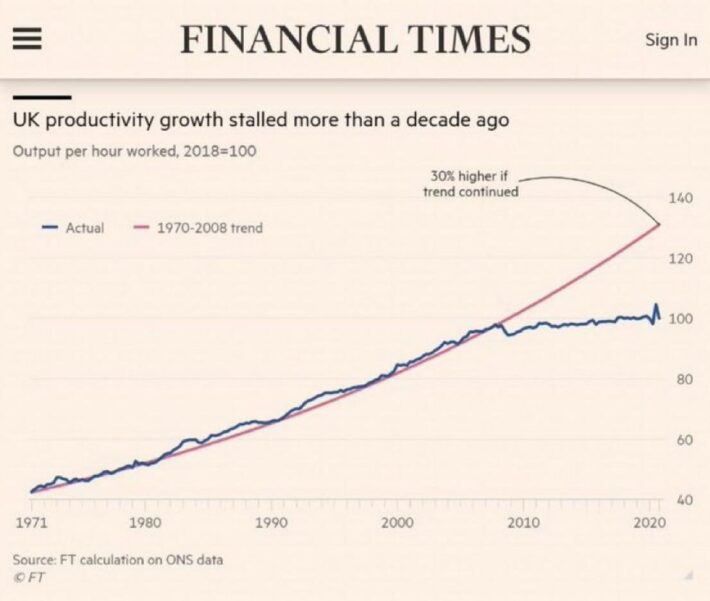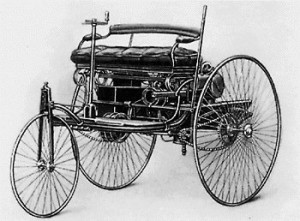In the past, this website was sort of my place to keep family and friends in touch. I first set it up in 2005, just before going away to Peru on travels. It was a great. Facebook had been invented but wasn’t generally available or popular yet, other platforms weren’t well thought through or scattered, Twitter didn’t exist. But installing WordPress on my cheap Yahoo web hosting turned out to be one of the easiest ways to publish content and share it with the world.
Tag: technology
The astonishing power of modern computing
Being very old (or at least, that’s how I feel being in tech!) means that after coming up to nearly forty years in technology, I’ve seen some changes.
My first computer at home, that I owned, that I could truly call my own, was a Dragon 32. It was a small, 32KB computer using the rather lovely little 6809 processor. This CPU ran at 2MHz and the system as a whole allowed me to learn a heck of a lot about computer science as a geeky teenager who was busy ignoring sports.
Continue reading “The astonishing power of modern computing”
The productivity paradox
I came across this chart recently and it gave me pause for thought as someone whose life work is designed to improve productivity. It shows that from 2008, although we know technologies have been growing in power, productivity growth suddenly dropped away from the trendline following the global financial crisis. Why?

This is where I fall back on an old story as a developer trying to make things more efficient. I worked with my colleagues to bring a client company the equivalent of about ten hours a day of labour saving due to using a well structured database for better data integrity over their previous ‘loose’ system. As they expanded, each branch would save at least an hour of time, and they were no longer capacity bound at each branch where more customers would linearly increase administrative work in a difficult recruiting environment. This would provide a return on investment (ROI) of less than a year.
It worked exceptionally well and the person we’d worked with said their staff were even worried redundancies might be on the way! This was never going to be the case in a growing company, because there’s an infinite amount of work to do.
All was good.
Then for some reason, our contact’s role was diminished and they eventually left the company. And the knowledge of the improvement left as well. The board’s innate distrust of anyone and their perception of us as no more than a cost base resulted in a great difficulty for us to help them without dramatically increasing costs by gold-plating every spec and decision.
This left the client unable to gain for advantage by exploiting our skills. It was difficult for us to see, and we could do little for them other to look for cost savings when, in reality, they needed to implement cost savings by using us more. Instead they opted for a recruitment based strategy to feed their growth and we parted ways as they shifted the system to a maintenance partner.
In all my thirty years of development experience I’ve seen this again and again. Instead of sticking with a solid set of developers who have learned your business details, chop and change to save money. Treat developers as a cost base and you lose so much knowledge that you’ll fail to gain productivity nearly as quickly as you could treating it as a partnership.
I don’t feel this is unique. I see lots of projects following an arc of big development then a cost reduction period which ends up losing the momentum of ongoing improvement.
Solving the productivity paradox
A strategy I now suggest when selling is to spend 60% of what you thought of on your project in year 1, then 40% in year two, 30% in year three, and then 20% a year throughout the product lifecycle. Software isn’t like building a bridge where things stabilise then stay them same for thirty years, sadly.
Fundamentally, I think corporate culture around custom software became both cautious and speculative following the global financial crash of 2008 and only invested in technology if it felt like it would create some impressive unicorn of an offering. We saw lots of developers tied up with venture capital chasing big things like blockchain and AI whilst ignoring the importance of daily incremental improvement that adds up to a huge return over time.
The answer then, is that if you have access to capital, you should stop chasing unicorns and start thinking about continuous pragmatic development aimed at dealing with all the little productivity blocks in your firm. Look to Kaizen style methodologies to help with structuring your processes around this.
What do you think? Feel free to comment!
The EU are bullying the UK
A short screenplay, by me.
It’s a Monday morning at a small train station on a mainline. It’s bustling as business travellers head to London for their week’s business. The air is cool, with people blowing little clouds of steam as they head into the station from their taxis and cars.
Mr Hock, a late-middle aged man with a red face and bumpy nose caused by years of excessive alcohol and rich food approaches the ticket office. Miss Nowak, a young Polish woman living in the UK for five years now, is behind the glass, and looks up as Mr Hock sets down his briefcase.
Miss Nowak (neutrally): Good morning. How can I help you?
Mr Hock (confidently): I’d like an open return ticket to London Euston please.
Miss Nowak: That will be £193 please. Are you paying by card?
Mr Hock (with irritation): £193? I’m not travelling first class then, how much for standard class?
Miss Nowak: That *is* standard class. If you need to pay less you can travel out of peak hours. Would you like that?
Mr Hock (exasperated): That’s outrageous! How can it cost so much? I used to travel this way a lot in the eighties and it only cost £20!
Miss Nowak looks down for a moment, then regards the queue of people behind Mr Hock.
Miss Nowak: I guess things have changed. Do you want a ticket or not?
Mr Hock, squinting one eye: Why are you bullying me?
Miss Nowak (confused): What? I… no, this is just how the prices work. Do you want a ticket or not?
Mr Hock (his face reddening): Well can’t you give me a special price?! I’m a very important person you know! People in shops often negotiate you know!
Miss Nowak: I can’t do that, and look, there are other peo….
Mr Hock (interrupting): I will pay £80! Not a penny more! And it must be first class, on the next train to London as I have a very important meeting at ten o’clock and will miss out on getting a very important job if I don’t get there on time!
Miss Nowak: I’m sorry, but rules are rules and I’m not allowed to give you a discount. If you want to go to London you’ll have to try a different way. Now please pay, or go, there’s a queue.
Mr Hock, now furious, grabs his briefcase and storms away to the exit of the station. Looking at his watch, he realises that if he misses the next train he’ll be late for his meeting, and then it dawns on him! A brilliant idea! He grabs his phone and scrolls through his contacts, looking for his friend John.
Mr Hock: John? Hi John! Yes… can you hear me OK it’s a bit… yes, good… OK, remember when we used to watch Scrapheap Challenge? Great wasn’t it? Shows how easy it is to make a vehicle! I need to get to London for 10am. It’s far too long to drive, and the train company is bullying me for £193! But if we can just knock up a home made train in an hour I can make my meeting and…
John interrupted, his voice is a little distorted over a poor mobile connection: Roger? What are you on about? We can’t build a train in an hour… Scrapheap Challenge is just a show and…
Mr Hock: Poppycock! The show only ever lasted an hour and they built all sorts of wonderful machines in that time!
John: No, it doesn’t work like that. These things are carefully orchestrated to make entertainment, and in real life making a train in an hour is impossible.
Mr Hock pulls his phone away from his head and stares at it, shaking with fury, before bringing it back to his ear.
Mr Hock: I see. Well if I fail to get to the meeting, it’s YOUR fault! I’m fed up of people with a can’t do attitude! What happened to plucky English spirit eh? EH? We need to stop letting train firms bully us with their inflexibility, high costs and hatred of people like us! I am proud! I fought in two world wars and won! Well not me personally, no, John… but people like me! And we didn’t make bouncing bombs in two hour…
[muffled voice on phone]
Mr Hock: Yes I know I saw it in a film, and it lasted two hours, it was amazing. Plucky English heroes!
John: You’ve gone mad, Roger. What are you on about? You don’t know anything about bombs or trains. It’s simply impossible. And even if you do make it, National Rail won’t just let you put it on the railway… and… why am I even bothering with this?
Mr Hock: Well it’s people like you that hold people like me back! This should be easy! John… John?
Mr Hock looks at his phone and realises John has hung up. He looks around, sees a taxi, and raises his arm. He gets in. The screen fades.
The taxi pulls up outside a scrapyard, and Mr Hock looks, optimistically, at all the materials there that he can use for his project. A large man in greasy overalls, dismantling an old car, eyes him up as he gets out of the taxi and approaches.
Mr Hock: Good morning!
Large man: Alright. What d’ya want?
Mr Hock: I’d like to make a train! I have one hour. Well, fifty minutes.
The large man stares at Mr Hock, up and down, slowly, without answering. Mr Hock starts to feel uneasy.
Mr Hock: Well?
Large man: Is this a gag or summat?
Mr Hock: I’m deadly serious.
The large man starts to laugh.
Mr Hock: What? Are you one of them? Are you in cahoots with the train company? Is this a conspiracy to take away my freedom on trains?
The large man, between laughs: Fuck off!
Mr Hock turns, and gets his phone out of his pocket. He dials a number and puts it to his head.
Mr Hock: Yes, hello, is that Stephen Barclay? Well, it looks like I can’t get to London for today after all. Yes, I know I wanted the job of chief negotiator in your department… yes… I appreciate that, it’s just I have some minor things to sort out, all fixable with technology of course, and then I’ll be there… Stephen? Stephen? Hello?
Screen fades out.
WordCamp UK – Great Stuff + a Little Controversy
I went to WordCamp UK 2010 in Manchester… this is my write-up of the event, and its controversies along with my presentations…
I’m just settling in at the office having spent the weekend at WordCamp UK 2010 which was staged in Manchester and is a community event for WordPress users and developers. I gave two presentations, one about WordPress in Big Media, and another about WordPress in the Enterprise. These followed on from presentations given at last year’s WordCamp.
The Craic

I’m going to say now that one of the key elements of a good conference or unconference is the socialising – this is where you meet people, bond with them over beers/food/dancing and form alliances that in the future could prove to be very powerful. You certainly get to make friends and feel like you’re a part of an actual community, and this happens in a way that you’ll never be able to reproduce with online technology. As a consequence it’s no surprise that the awesome Thinking Digital conference has been nicknamed Drinking Digital by some wags.
As ever,Tony Scott excelled himself by getting us access to the famous Factory Manchester (FAC251) which also happens to be across the road from a magnificently geeky pub that sells good beers, has various classic 8 bit and 16 bit computers adorning the walls, and classic arcade games on free play. Awesome.
The Presentations
There was a typically varied range of presentations running across three rooms, along with other folk busy coding up for the WordHack (the fruits of their labours are online). One particular stream that particularly caught my attention was that of a sequence of involvement from John Adams of the Department for International Development. He ran a free-form discussion group on testing strategies which was followed by an interesting talk on PHP unit-testing Nikolay Bachiyski of GlotPress fame. This session showed up some of the lack of structure in general testing of WordPress core code, plugins and themes. Although the approaches used were probably fine for a publishing platform, they would struggle to gain ISO approval. In other words, you wouldn’t want to fly on a WordPress powered plane!
Other presentations that I particularly enjoyed were Michael Kimb Jones’s WOW plugins, and Toni Sant’s very underattended Sunday morning slot where he discused the way WP has helped with a range of Maltese websites.
The Controversy
What’s a WordCamp without at least a little controversy? However, for the attendees of this one, this was a biggie… Jane Wells is Automattic’s Master of Suggestion (seriously, that company has some weird job titles) and she made a suggestion that we shouldn’t have a WordCamp UK, but instead locally organised WordCamps for cities.
There’s a number of issues I have with this:
- Everyone in the UK knows that quite quickly WordCamp London would be the big one with all the attention in both media and attendance. It would quickly dominate – in large helped by the enormous population density of the capital. A WordCamp UK in London would be fine and popular (also considerably more expensive) but that’s all that’s needed.
- Many British cities have intense rivalries whilst we all still stand together as a nation – there are folk in Glasgow who would never attend a WordCamp Edinburgh, but would definitely be more interested in a WordCamp Scotland. End result? Cities would have small attendances by and large, and our impressive capacity for indifference for minor events would mean that they’d end up as little more than tiny, cliquey gatherings. Anyone who’s tried to run GeekUps will understand this problem.
- A lot of work, energy and our own money has been spent on building up WordCamp UK. Is Jane seriously suggesting we should dump that?
- What is Jane’s authority on this? She’s simply an Automattic employee. We chose WordCamp UK and its structure – it’s ours. If someone else wants to run a WordCamp UK in the country they’re perfectly entitled and there’s no real reason why we couldn’t have three or four running each year – that would be a huge success. A highly capitalistic organisation that is just one of thousands of contributors to the project and which plays no part in actually running most WordCamps shouldn’t get so involved.
- The UK is also very small – 90% of the population can reach all past WordCamp UKs in less than 3hrs – there is no real problem about accessibility.
- None of the UK’s key WordPress community members want to give up WordCamp UK.
- Jane admitted only six or seven people had complained to her about the situation, two of which turned out to be in Ireland – which except for a small part isn’t in the UK at all. She couldn’t confirm whether they were Northern Irish or not, which was actually something of a poor mistake to make in front of 150 or so Brits.
- Us Brits are a pretty apathetic bunch at the best of times – actually running a WordCamp in each major city would be surprisingly unlikely to happen – there were only two bids submitted for this year’s event – one in Portsmouth and one in Manchester.
- The whole point of the *camp suffix is that it’s all free and easy with no big organisations sticking their oar in. They are inconsistent and joyful. They’re fun. Automattic should keep out.
- The WordCamp name is not trademarked, and we’ve been using it in the UK for some time now. It’s ours!
Of course, there are two sides to each argument. Here’s some reasons and benefits to splitting up WordCamps in the UK:
- If somebody wished to run a WordCamp for their city they may feel that the UK badge is dominating and there’d be little interest as a consequence if it was called WordCamp Bristol, or WordCamp Salford.
- A national event called something like WordConf could happen.
- Erm…
Thing is – we can’t necessarily win this battle here in Britain. We don’t control the WordCamp.org website – Matt Mullenweg does (he has the domain registration in his name) so if we fight to keep calling it WordCamp UK there’ll be no ongoing support for the event from Matt and his team if they wish to stop the use of the UK moniker.
Which would mean standing up to them. Do we want to? Are we prepared for a fight on this? What do the likes of Mike Little (co-founder of the WordPress project) and Peter Westwood (a UK based core developer) feel about this?
Interestingly we were told the same thing applies to the likes of WordCamp Ireland which will now face this problem – but I wonder if Matt understands Ireland particularly well (we know Jane doesn’t) and that in that country the dominant WordCamp would quickly become an expensive Dublin event. You may get one doing well in Cork, but Kilkenny, with a population of just 22,000 and which staged this year’s event, probably wouldn’t be able to sustain an annual WordCamp.
So, Jane has to really allow each country to understand its own social constructs and history and let their own communities choose how they do things. One or two may complain, but it’s not possible to please everyone.
And we showed off too…
My company Interconnect IT have released, through our Spectacu.la brand, the following plugins which you may find useful:
I couldn’t help using the Discussion plugin to run some live discussion sessions.
And The Thanks
I can’t say thank you enough to the people who make WordCamp UK a success for no personal reward. Tony Scott leads it up, with Mike Little, Nick Garner, Chi-chi Ekweozor, Simon Dickson and many many more working hard behind the scenes. Also to Nikolay to letting me play with the fastest 85mm lens I ever saw! Thank you, you’re wonderful people.
WordPress in the Enterprise Presentation
WordPress in Big Media Presentation
Of WordPress Training and Learning
Over at Interconnect IT, where I work, we’ve found that demand for our WordPress Training Courses has shot up over the past year or so. And it’s certainly interesting to see where the work comes from.
Curiously, it’s very polarised – we either work with smaller one man band companies like Jason Nevin who runs a house removals company site who are looking to switch technologies, or big corporates and government agencies such as Shop Direct, The US Mission to the UN and the Department for Business, Innovation and Skills.
I’ve been thinking about why there’s such a big dip in the middle of our client base – 90% of our business is groups with over 500 staff or with fewer than three.
The Gap
Small, one man companies tend to involve highly motivated individuals. They understand the important of their skills, and they know that in the tech sector they have to always stay up to date. Large corporates tend to understand this too, and have allocated training budgets to make sure they keep up to date. Government departments are often a little slower with new technology, but they too need to keep efficient or tax payers will kick up a stink.
And WordPress is a very efficient platform for running many informational websites.
But why are medium sized companies not coming to us in nearly such large numbers as micro enterprises and large corporates? Let’s see…
Budgets
I’ve noticed that medium companies often have people who are extremely good at what they do, but I do find that there are often significant skills gaps. I’ve dealt with someone from a school (medium) who didn’t realise that you don’t have to close an application in Windows in order to see another application. Each time she cut and paste she’d open one document, select the text, close the document, then open the receiving application and paste the text there. Productivity, as you can imagine, was pretty poor.
I think a lot comes from budgets – many firms around the 50 people size aren’t always able to make good money. They have to be careful where they spend it – they’re not big enough to have training departments who make sure everyone is up to date, and they’re usually busy.
Culture
Another thing with smaller firms, I believe, is that they’re often started by individuals with a lot of skills – these are flexible folk who can teach themselves and learn quickly from books and the internet. As they grow they try and hire similar people, but eventually there comes a point where a lot of staff are there for the job. They need training because they aren’t going to go to the trouble of autodidactism. They have a job to do, and they’re going to do that and no more or less.
At best, they’ll get on-the-job training.
Our Marketing
We don’t do a lot of it, to be quite frank. But perhaps our website, approach and costs simply don’t ring true with people in medium sized companies looking for WordPress training? Do we need to get advertising in business magazines, such as those sent out by the FSB?
Summary
I suspect that the truth is that a company always needs to look at the skills of staff, but as they reach a certain size they have too much going on to give it much thought. Once they break through that difficult 50 man barrier things seem to start to change again.
But how do we change this? I’m not sure we can, easily. Governments often give generous grants, and around here we have Skillworks which helps a little, and we do get local approaches – however, the person paying still has to pay a significant contribution and specialist training is never all that cheap.
Do you have any ideas of how skills can be improved in small to medium sized enterprises? Should we be marketing our courses more proactively? What about scheduled classroom courses that keep things at a lower cost, albeit needing more time from the attendees? I’d love to hear your thoughts – especially in the field of WordPress.
Saab 9-5 Aero (HOT) Estate For Sale – SOLD!
Given that I’m selling my motorbike at the moment as well, you may well wonder if I’ve had some kind of financial crisis of my own.
But thankfully, no. I just don’t need such a large and fast car any more. When I was doing a lot of sprinting I needed something capable of towing a car trailer comfortably and reliably. But I also wanted something I could enjoy driving as my daily transport.
City Commuting Doesn’t Suit Big Cars
And that’s what happened, basically – for the past 18mths or so I’ve driven 12 miles to Liverpool city centre, and 12 miles back – congested roads, with a lot of stop-start action. In the end I bought a Golf TDI which makes much more sense for that kind of driving. Although I’m tempted to keep the Saab, which I will if I can’t get the right price, I know that in reality it’ll get far too little use in the coming year or two. The sensible decision, then, is to sell it.
So, here goes…
Specification
This is a 2004 (04 plate) 9-5 Aero HOT Estate with 250bhp. The full specification items worth listing are as follows:
Bi-Xenon headlights, headlight washers, factory alloy wheels, factory CD/Radio, Nokia Bluetooth Hands-Free (works with most phones), electric windows all round, electric mirrors, heated mirrors, split climate control, dual-colour leather seats, leather steering wheel, lots of airbags (5* NCAP Rating), ABS, Electronic Stability Program, new Vredestein Giugiaro front tyres and lots of life on the identical rears, detachable tow bar, FSH (main dealer or specialist only), two owners (first owner the dealership as it’s an ex-demo car), 58,000 miles, 10 months MOT, Tax until 10/09.
The car is in a gorgeous Capuccino Black. In other words, most of the time the car looks black or very dark grey, but when the sun shines on it you realise that there’s a pearlescent bronze finish. The photos below really capture this, which took some effort as it’s not easy to show in pictures – normally it just looks black.
Damage Worth Noting
I’m nothing if not thorough and feel it’s worth noting everything even if it’s minor so that you’re not disappointed if you travel – the car has a couple of tiny dings from the careless door opening of others. It has a small ding that’s almost but not quite invisible under the nearside rearmost window with a matching scrape on the bumper – that was a van in Paris that did it, and no, he didn’t leave details. But I’d say very few people can spot these marks – I’ve taken close-ups, however, to try and show marks. Also, one of the alloys has a barely visible kerb scrape on it. Picture shown. There’s a few minor and normal stone chips that could do with being dealt with by chipsaway or similar, but one left a tiny ding on the bonnet. Another tiny ding was caused by the biggest hailstorm I’ve ever seen, over in Italy. I expected worse….
Get in Touch – Price to be around £6200
If you’re interested, you can contact me through the contact form on this site, or simply call me, during office hours or in the evening on 0151 709 7977.
If you’re wondering whether someone with the word ‘mental’ in his website address and a history of motorsport will have taken care of his car… well, in racing if you don’t take care of your car you often end up with an accident at some point. Or losing. I apply the same philosophy to my road cars – look after them and they look after you.
Enjoy the gallery – simply click on a thumbnail to get the big version, and you can then move between images by clicking on the arrows that come up.
And a Deep Zoom Seadragon view of the under-bonnet area
And now, PhotoSynth
Yes, I may have been playing – I’d be interested to know what you think of this use of technology…
Speed Limiting in Cars
As part one of my campaign to introduce the concept of actually thinking to UK media, pundits and government, I’m covering the nasty little idea of automatic speed limiters being introduced to cars – so that people can, basically, stop thinking about the speed they drive at. That’ll work…
This subject has been rolling along for some years now. Basically the technology now exists to be able to instruct a car what speed it should travel at.
Now, if you’re a control freak, this is like a gift from heaven. If you’re a control freak in power (yes, that includes you Jacqui Smith) then it’s even more wonderful, because it hands you a whole ton of power.
Like everything, of course, it’s not all bad. There are plenty of good reasons for speed limiting cars, trucks and even fire engines. That doesn’t necessarily mean it’s a good idea.
How The Pro Speed Limiters Present Their Argument

There are currently a lot of fears in society, especially Western society. We’re scared of global warming, the economy, terrorism, and dying in a fiery ball of fire when some chav in a misguidedly tuned Vauxhall Nova comes careering head-on towards you as a result of massive overconfidence and a lack of skill. Throw those arguments into the air and you have some pretty strong arguments as to why we should introduce speed limiters.
Here’s a quick list of their key points:
- Safety – you’ll hear this a lot. And it’s true. Go slower and if all else is equal safety will go up.
- Economy – by being forced to go slower, you’ll drive more economically and be able to save the world from Global Warming at the same time.
- Reduced need for thirsty, fast cars – true to a degree because what’s the point in a big V8 if you hit speed-limited wall at 70mph?
- Reduced load on drivers – no need to think about speed, or worry about speed cameras.
- It’s optional, there’s no need to fit a speed limiter if you don’t want it.
- If you do have it, there’s an override button for those rare occasions you may need to go faster than strictly legal.
- If only a minority of cars have this limiter, the effect will be to slow down others without it.
- Lot’s of people are killed or injured daily, and anyone arguing against speed controls must be in favour of those deaths.
The arguments are mostly presented by different types of organisation. You have the emotionally irritating Brake, and the more calm but government funded (don’t forget this fact, they may sound independent but they aren’t) Motoring Forum, the UK Commission for Integrated Transport, and various other safety campaigners.
I can’t find a quote from Jacqui Smith on this subject, but I’m sure she’ll be along soon.
And The Argument Against
Well there has to be some rational argument against this, but unfortunately we’ve only got Safe Speed getting all the media attention on the other side. Holy Fucking Shit. I mean, really. Have you seen them? You wouldn’t trust these people to decorate your house, so why would you trust them with setting the agenda on speed limits and motoring policy?
Instead, why not get a psychologist who’s studied driving onto your show? Or, at a stretch, someone from the Institute of Advanced Motorists? But no, instead you get to listen to a muppet from Brake arguing with a muppet from Safe Speed. I suppose there’s only so many pundits to go round and the radio and TV stations pick the easiest ones they can find.
Sheesh.
But here we go – this is other people’s arguments, don’t forget. Mine come later.
- It’ll encourage zombie behaviour, which is almost certainly true – in the US where freeways were once limited to the mind-numbingly dull speed of 55mph, you get to see a lot of this.
- It’s a symptom of control-freakery – yep, almost certainly.
- Speed doesn’t kill, it’s inattentive driving, which kind of cycles back to the first point.
- It’s the thin end of a wedge which will end with all cars having compulsory speed limiters.
- It probably won’t affect KSI (Kills and Serious Injuries) rates in the positive manner the pro side would like to see.
- Slowing down can cause more accidents.
Thankfully, spokefolk from the RAC, AA and the likes are occassionally wheeled out to discuss such issues and they tend to be a bit more rational and thought out. But they’ve become rather dysfunctional resellers of insurance and recovery services these days, rather than the clubs and associations that they originally started out as. Consequently they have to toe a fine line between keeping customers (many of whom are the unthinking fools I worry about) and not upsetting the government (filled with the misguidedly thinking fools I also worry about) into adding more restrictions to both their customers and their businesses. So they tend towards making statements rather than take the risk of getting involved on radio or TV.
Of course, avoiding radio or TV is a sensible move for many. I’ve listened to myself on Radio and I’m clearly a rambling buffoon who doesn’t know when to shut up and who talks over others. Heaven knows what would happen if I found myself on TV. Of course, it’s not totally bad to be a buffoon – look how well Boris Johnson’s done out of it.
The best argument against this, so far, comes from the easy to respect Derek Charters, from the Motor Industry Research Association, who believes limiting speed automatically could cause accidents.
“The last thing you need is one car to be overtaking and then pull back in, in front of the cars in front, because that braking event will then cause everybody to start to slow down, which will then compress the traffic, which then causes an incident.”
The Dave’s Attempt to Think on this Subject
- Oh Jesus, do we need the government controlling us just a bit more?
- Would government controlled GPS units eventually be used to track our cars’ every movement?
- A world full of cars doing identical speeds is so horrifically soporific that I suspect we’d be having massive pile-ups in no time.
- The unthinking are the worst people to get this technology – they’ll just turn into motoring zombies.
- Going faster is fun. Sometimes it’s good to be able to have a bit of fun, you know, even if it does make the world ever so slightly less safe.
- All speeds are dangerous – being crushed to death by a 2mph Audi Q7 isn’t much fun either – stop people from realising how dangerous cars are and boom! more dead people.
- It’ll probably mean the end of the fantastic Top Gear show.
- It’ll make moving to South America far more appealing.
The key arguments for or against this idea are really just noise. The question we should be asking is at what point should drivers give up responsibility for the movements of their cars? Lane sensing technology has matured enough that you could conceivably place your Honda at the beginning of the M6 and drive all the way to Scotland without touching the wheel, brakes or throttle again, coming to a stop when the traffic in front does so, and accelerating to a set speed when it’s possible to do so. I remain to be convinced that all this is a good idea, but at least it’s entirely within the control of the driver – he can choose what is and is not switched on, and where.
GPS technology is constantly improving, as are sensors. It’s only a matter of time before we can simply climb into our cars, shout “take me to work, autocar!” and climb into the back for a nap. Sounds like a wonderful idea to me and I wouldn’t care what speed the car travelled at so long as it woke me up on arrival and neatly parked itself while I go for a pee.
Partial implementation, on a wide scale, of speed limiters or even smart cruise control could be lethal. Each car would end up driving at ever so slightly different speeds. Overtaking moves could be measured in miles, and it wouldn’t matter if you didn’t have a speed limiter – you’d be stuck behind those with them fitted. And those who choose to have them fitted would be sitting in a smug pool of self-superiority, knowing they’re driving at the maximum safe speed. They’d be wrong, of course. 70mph is safe when it’s clear and dry. It’s safe even when it’s wet. But in a deluge it’s lethal. But having given up the act of thinking about speed they would just keep their foot mashed down on the carpet. Until they eventually plough into the back of the car in front that they couldn’t see.
And that’s why this topic has made it into the Campaign for Thinking. Full automation is a good thing, it means you can go and think about something else. But a world full of drivers who believe thinking about speed is only for the government… God preserve us!
Now, could the government get on with thinking about things they could help us with? Infrastructure, international security, the economy, tax… that kind of stuff? The big, hard problems that they have the power to do something about? 3,000 people a year die on the roads. 60,000 people a year die from murders in South Africa. And providing assistance to unstable or impoverished countries could save the lives of millions. Unfortunately it’s hard to get elected on the promise of saving the lives of AIDS stricken Tanzanians, but you could save or dramatically improve the lives of more than 3,000 of them with the millions spent on speed limiter studies. Yes, I know it’s a straw man argument, but a little sense of perspective on the point of all this would be useful.
Linkage
http://news.bbc.co.uk/1/hi/uk/7803997.stm
Very Cool Camera Tracking Technology
The chaps at Cam-Trax have come up with a rather nifty bit of software that can turn practically any easily visible object and a cheap webcam into a game or PC controller.
I wish I could code that sort of stuff….
Now I’ll get back to working on SQL queries when I should actually be out partying…
21 Years In IT
I chanced upon a site listing the first 100 .com registrations ever made – and it rather startled me. I started my IT career in 1987, first working as a printer operator on the mainframes at ICI, before moving to systems operations in at the beginning of 1988. Later in 1988 I became a trainee programmer (my career never moved as fast as that first 12 month period!) and so I continued.
So when I took my first tentative steps in professional IT there had been fewer than 100 .coms registered. Today there are over 76,000,000 active domains and over 280,000,000 that have been deleted, according to Domaintools.com.
Things have changed markedly in this industry. 21 years is nothing. The internet has quite literally exploded around us. I started surfing the World Wide Web in 1993 and frankly there was nothing much there. It was hard to find sites, and performance was painful. Running your own site was difficult, and it wasn’t until 1996 that I first registered a domain – at-speed.co.uk with the intention of creating an online resource for motorsport news. It was a difficult but exciting experience, but I felt that it was too early – the Internet wasn’t really a mass market item yet, even though the potential was starting to be realised. I had bugger all money at the time too, so needed to go out there and get a better paying job. Interestingly I used to get e-mails from the UK Motorsport Index (which still has the same design as it did then!) complaining about our high budget approach being against the spirit of the web. I doubt he realised that we had absolutely no money and everyone contributed their work for free. One thing that was as true then as it is now is that good <> expensive.
So now where are we? We have applications delivered via the browser, high performance search engines that actually work, and we enjoy the power of a huge number of free social services. Many of these services are heavily funded and will require monetisation at some point, or they’ll close… that could be interesting. Google managed the transition from a giveaway to a fee earning service without ever charging the people that made it successful. Can the likes of flickr, Facebook and WordPress.com?
Time will tell… What’s certain is that the pace of change, so marked over my career, is probably going to continue accelerating. The next 21 years could be as equally fascinating…




































